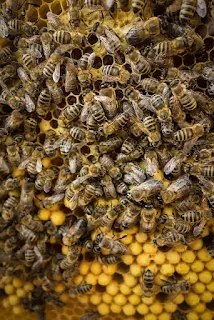Apiculture Industry and Products and Their Uses
Apiculture, also known as beekeeping, is the practice of maintaining bee colonies, typically of honeybees, for the production of honey, beeswax, and other bee-related products. The apiculture industry plays a vital role in agriculture and biodiversity through the pollination of crops and plants. Beekeeping is widely practiced both as a hobby and a commercial activity, contributing significantly to rural livelihoods and ecosystems.
Major Products of Apiculture
1. Honey
Honey is the most well-known product of apiculture. It is a natural sweetener
made by honeybees from the nectar of flowers.
Uses of Honey:
1. Food: Honey is consumed as a natural
sweetener in beverages, baked goods, and as a spread. It is also a key
ingredient in various traditional dishes and recipes.
2. Medicine: Honey is known for its antimicrobial
and anti-inflammatory properties, making it useful in treating coughs, sore
throats, and minor burns or wounds.
3. Cosmetics: Honey is used in skincare products for
its moisturizing and antioxidant properties, making it a common ingredient in
lotions, lip balms, and face masks.
2. Beeswax
Beeswax is a natural wax produced by honeybees to build their hive. It is
collected and used in a variety of products.
Uses of Beeswax:
1. Candles: Beeswax candles are valued for their
long-lasting, clean-burning properties and pleasant natural aroma.
2. Cosmetics: It is commonly used in the formulation
of lip balms, moisturizers, and other beauty products due to its ability to
form a protective barrier on the skin.
3. Medicines: In traditional medicine, beeswax is
used as an ingredient in ointments and salves to treat burns, cuts, and rashes.
3. Propolis
Propolis, also known as "bee glue," is a resinous substance collected
by bees from tree buds and used to seal cracks in the hive.
Uses of Propolis:
1. Medicine: Propolis has antimicrobial,
anti-inflammatory, and antioxidant properties, making it useful in the
treatment of infections, wounds, and oral health products such as toothpaste
and mouthwash.
2. Skincare: Due to its healing properties,
propolis is also used in creams and lotions designed to treat skin conditions
like eczema and acne.
3. Health Supplements: Propolis is
used in dietary supplements aimed at boosting the immune system and improving
overall health.
4. Royal Jelly
Royal jelly is a secretion produced by worker bees used to feed the queen bee
and larvae. It is highly nutritious and contains proteins, vitamins, and fatty
acids.
Uses of Royal Jelly:
1. Dietary Supplements: Royal jelly is
consumed as a health supplement for its potential to boost immunity, improve
energy levels, and support skin health.
2. Cosmetics: In beauty products, royal jelly is
valued for its ability to rejuvenate the skin, promote collagen production, and
improve skin hydration.
5. Bee Pollen
Bee pollen is a mixture of flower pollen, nectar, enzymes, and bee saliva,
collected by bees as a protein source for the hive.
Uses of Bee Pollen:
1. Nutritional Supplements: Rich in
proteins, vitamins, and minerals, bee pollen is consumed as a supplement for
boosting energy, improving digestion, and supporting overall health.
2. Medicine: Some research suggests that bee pollen
may have anti-inflammatory and immune-boosting effects, making it popular in
natural medicine.
3. Cosmetics: Due to its antioxidant properties, bee
pollen is sometimes added to skincare products aimed at protecting the skin
from environmental stressors.
6. Bee Venom
Bee venom, also known as apitoxin, is the substance bees inject when they
sting. It contains proteins and enzymes that trigger various immune responses.
Uses of Bee Venom:
1. Apitherapy: Bee venom therapy is used to treat
conditions like arthritis, multiple sclerosis, and chronic pain due to its
anti-inflammatory properties.
2. Cosmetics: Bee venom is gaining popularity in
anti-aging skincare products due to its potential to increase collagen
production and reduce wrinkles.
3. Medicine: Bee venom is also being researched for
its potential use in treating autoimmune diseases, nerve pain, and some forms
of cancer.
Importance of Apiculture to Agriculture and Economy
1. Pollination Services: Honeybees are critical pollinators for many crops,
contributing to the production of fruits, vegetables, and seeds. Apiculture
enhances agricultural yields and biodiversity, making it essential to food
security.
2. Economic Contribution: The apiculture industry generates significant income
for rural communities. In addition to the sale of honey and other bee products,
pollination services provided by bees are essential for commercial agriculture.
3. Employment Opportunities: The growing demand for honey, beeswax, and other bee
products creates employment opportunities in beekeeping, processing, and
marketing.







0 Comments